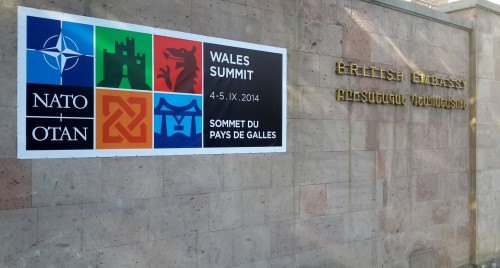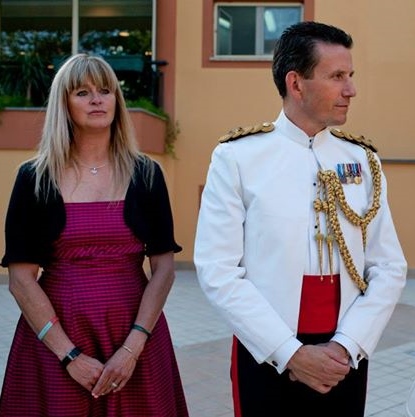12th August 2014 Yerevan, Armenia
NATO in a nutshell: interview with Defence Attache Lt-Col Nick Wilkes
 Ahead of the NATO Summit, to be hosted by the UK this year on September 4-5 in the beautiful, mountainous country of Wales, we are highlighting some of the human stories behind NATO and the UK armed forces. Our first ‘NATO in a nutshell’ interviewee is Lt-Col Nick Wilkes, the UK’s Defence Attache for the South Caucasus. He is currently based in Tbilisi with his wife Caroline, but frequently travels to Yerevan and Baku.
Ahead of the NATO Summit, to be hosted by the UK this year on September 4-5 in the beautiful, mountainous country of Wales, we are highlighting some of the human stories behind NATO and the UK armed forces. Our first ‘NATO in a nutshell’ interviewee is Lt-Col Nick Wilkes, the UK’s Defence Attache for the South Caucasus. He is currently based in Tbilisi with his wife Caroline, but frequently travels to Yerevan and Baku.
Nick, you have been in the British armed forces now for 33 years. Why did you originally decide to join up?
I wanted to join the army from the age of 7 – I don’t know why! My father had served, but left when I was very young. I went straight to Sandhurst [note: the prestigious British officer training academy] from school at the age of 18 and joined the Royal Logistic Corps.
Why did you choose the Royal Logistic Corps?
My father’s one piece of advice was: if you join the army, choose something which will also give you a career when you leave. The RLC is known jokingly as the Really Large Corps – it has over 16,000 people and is the single largest corps in the British Army. It covers project management, distribution, supply, catering, operations management – all useful skills in business. But it’s also absolutely core to everything the British armed forces do. You can’t fight a war without logistics.
Did you ever serve anywhere else?
At one point we were offered the chance to try out something new and I wanted to be a helicopter pilot. I passed the selection tests, but failed the medical. The personnel team said that until they sorted out my next move, they would send me to the Royal Marines [note: the Royal Marines do not have their own logistic troops so the army provides them, but the logistic troops still have to pass the Commando course]. They said, ‘But don’t worry, you won’t have to do the course because you won’t be there long enough’. The next day I found myself on the way to Norway for 3 months to do Arctic warfare training and then a week after my return I found myself doing the two-month Commando course. I ended up spending 7 years with the Royal Marines – by accident!
How have you been involved with NATO operations?
Working with NATO takes a different mindset. You have to get used to working with so many different countries. It helps you to understand other nations better – and to recognise how we all improve and contribute to our collective security by finding a way to work together.
One of my jobs was as a Staff officer with the Headquarters of the Allied Command Europe Rapid Reaction Corps (ARRC). I was responsible for standardisation of equipment and procedures among Allies – a really difficult job, since everyone thinks their equipment and their way of doing things are the best. NATO has things called Standardisation Agreements (STANAGS) aimed at providing common procedures. We produced many of those, but in the two years that I was there we found very little equipment which every nation agreed to use.
Just before I left ARRC in 1995, I carried out the recce for their deployment to Bosnia as the NATO-led Peace Implementation Force (IFOR) for Operation JOINT ENDEAVOUR. I’ve also been to Afghanistan twice. The first time in 2008/9 I was responsible for providing logistic support to all UK forces on the ISAF mission. The second time (2012/13), I was leading the team developing the new Afghan National Army Officers’ Academy (ANAOA). This is the UK’s legacy project for Afghanistan and was based upon the the UK’s Royal Military Academy Sandhurst. I used to be an instructor at Sandhurst, and very much enjoy training the next generation.
This is your first time as a Defence Attache. What do you enjoy about the job?
I know that the British Armed Forces are held in high esteem across the world and I am immensely proud to wear that uniform. It is my role to represent our armed forces to the best of my ability and to uphold our values and standards. One of my main roles is to offer members of the Armenian Armed Forces opportunities for training on UK funded courses, and to identify opportunities where the UK has useful expertise for Armenia. I am always looking for new areas where the UK and Armenia could work cooperatively, for example with the Ministry of Emergency Situations (MES), where both our joint experience in Disaster Relief could benefit each other.
The other main part of the job which I enjoy immensely is meeting people – it is the people who make a job enjoyable!

Tell me two things about you which tell us something about your character?
- I am immensely patriotic. I am a devoted Royalist and I am passionate about Remembrance Day – the day, on 11 November, when in Britain and the Commonwealth we remember the sacrifice of the many soldiers who have given their lives for their country. This year is particularly symbolic – the 100th anniversary of the start of WW1. I am looking forward to being involved in special commemorations this year in this region. I am also passionate about the importance of recognising and honouring war graves. When I retire from the army, I would love to work with the Commonwealth War Graves Commission.
2. We have four children who have all grown up and left home. We now have dogs & cats!